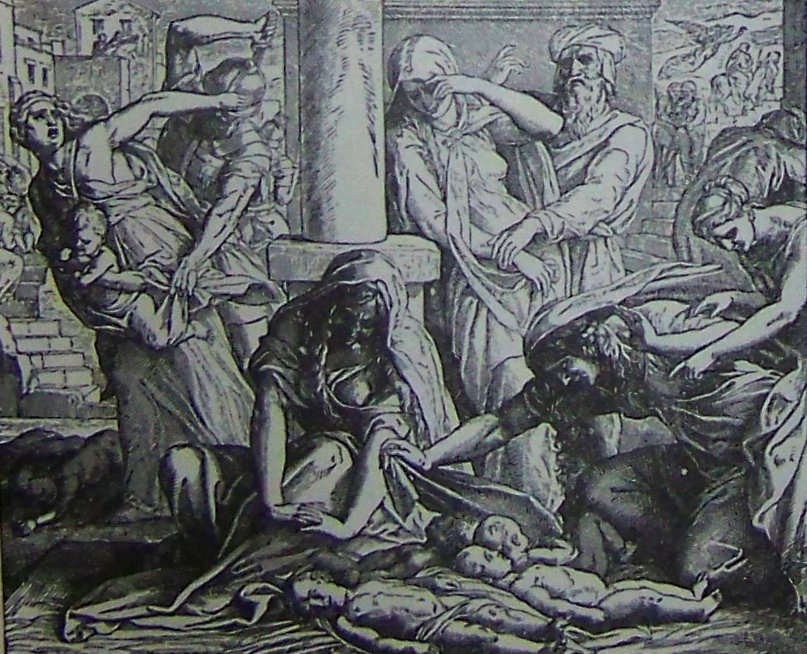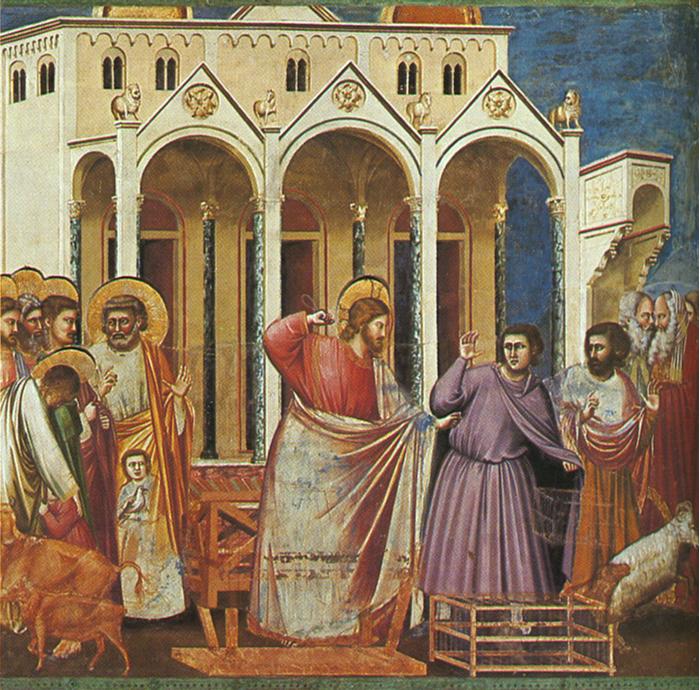Old Testament
the Lord struck down all the firstborn sons in the land of Egypt, from the firstborn son of Pharaoh, who sat on his throne, to the firstborn son of the prisoner in the dungeon. Even the firstborn of their livestock were killed. Pharaoh and all his officials and all the people of Egypt woke up during the night, and loud waiting was heard throughout the land of Egypt. There was not a single house where someone had died.This act of horror needs no additional comment.
After that, Pharaoh kicked the people of Israel out of Egypt. He asks Aaron and Moses to bless him as they leave. Even if the God of the Israelites is a genocidal monster, he is still a powerful being.
We also get a couple descriptions of how the Israelites should observe Passover, including three or four repetitions of the command not to eat yeast during that time. I guess that part was important.
Inspired by commenter big-bad-al, it's math time!
- Number of men to leave Egypt with Moses and Aaron: 600,000 (Exodus 12)
- Time the Israelites had been in Egypt: 430 years
- Genealogy of Moses and Aaron: Levi (137 at death), Kohath (133 at death), Amram (137 at death) (Exodus 6)
- Ages of Moses and Aaron when they started making demands from Pharaoh: 80 and 83 respectively (Exodus 7)
- Number of Israelite men to originally go to Egypt: 70 (Genesis 46)
So, first, let's look at the claim that that the Israelites spent 430 years in Egypt.
- Levi must have been at least 40 when he came to Egypt.
- Levi was Joseph's older brother
- Joseph was 30 when he started serving Pharaoh, and it was 9 more years before his family came to Egypt (seven years of plenty plus the first two years of famine)
- Plus Levi is older than Joseph. There are 7 brothers between them.
- He was probably more like 50 since there were 7 brothers (by several mothers) between Levi and Joseph.
- If Kohath was born in Egypt, he could have been born at most 97 years after the Israelites came to Egypt
- Assuming Levi came to Egypt at age 40 and had Kohath when he died at age 137
- Thus, the time between Levi coming to Egypt and the exodus was at most 97 + 133 + 137 + 80 years = 447 years. We are okay so far.
- Of course, that's making the unlikely assumption that all the men had the relevant child at the end of their life. Remember, Abraham was laughably old when he had Isaac at age 100.
- But oops! We're being too optimistic. According to Genesis 46, Kohath was one of the 70 who went to Egypt with Jacob.
- Assuming he was an infant, that makes for a maximum of 133 + 137 + 80 = 350 years between the Israelites coming to Egypt and the exodus. 80 years short of the needed 430.
Now let's look at the population growth.
- To get from 70 men to 600,000 would require the population to double about 13 times, or about every 33 years.
- How many male children would each man have had to had survive to adulthood to achieve that? Well, it depends on the number of generations.
- 3 generations: 20.5, 4 generations: 9.6, 5 generations: 6.1, 6 generations: 4.5
- Now, if we factor in the fact that about half the children a women has are children and a 40% child mortality rate, we get that each woman must have had this many children:
- 3 generations: ~70, 4 generations: ~32, 5 generations: ~20, 6 generations: ~15
- Does this seem reasonable? Well, it depends on how strictly you interpret God's proclamation to Abraham "In the fourth generation your descendants will come back here" and what you consider a generation.
New Testament
Jesus' disciples find a colt of a donkey for him to ride into Jerusalem. This supposedly fulfills another prophecy.
Tell the people of Jerusalem,This comes from Zechariah 9:9. Let's look at the original.
"Look, your King is coming to you.
He is humble, riding on a donkey—
riding on a donkey's colt"
Rejoice, O people of Zion!Interesting omission, leaving out the "righteous and victorious" part. It also does not reflect well on this prophecy that the original context has the king coming after a series of military victories.
Shout in triumph, O people of Jerusalem!
Look, your king is coming to you.
He is righteous and victorious,
yet he is humble, riding on a donkey—
riding on a donkey’s colt.
Jesus then kicks the money changers and sellers of sacrifice animals out of the temple and starts healing from the temple. Today we also read about Jesus cursing a fig tree. See, Jesus was hungry, but this fig tree did not have any figs. So he cursed it and it withered up in front of him. This shows Jesus' power, but it also shows the temper we have seen flare up many times in the Book of Matthew.
Psalms and Proverbs
The psalmist continues to have troubles and continues to want to be delivered from them. The proverbs teach us that wicked people are constant liars who plot evil and constantly stir up trouble.





It's hard not to crack up at the way Jesus flips out over a plant. Stuff like this is worth remembering when certain apologists give us trilemmas like Liar, Lunatic, or Lord. What's wrong with lunatic? The guy curses freakin' fig tree!
ReplyDeleteWhat you miss is the symbolism of the Fig Tree. The Fig tree represents Israel, without Fruit. The cursing of the fig tree is not over Jesus' personal hunger issues but because of the symbolism: There were those that were hungry for spiritual things, and the tree should represent Israel's ability to provide. Not being able to, as it was spiritually dry (though "religiously" heavy), he cursed it, and caused it to wither, as Israel itself did, finally being destroyed by AD 70.
ReplyDelete